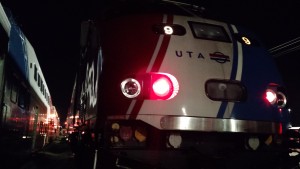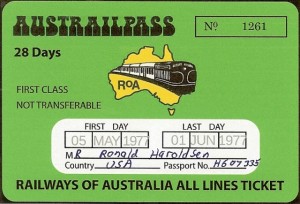”
As we emerge from the cold of winter, I have a possibility of also emerging from the dark of night. On our upcoming Bid Day, all the UTA FrontRunner engineers line up according to seniority and choose our work for the next four months. On the last bid, I was number 46 of 46. That didn’t leave a lot of choices of work, driving me to continue my nocturnal life that began when I licensed eight months ago. This time I am bidding number 43 out of 52. A little better chance of seeing some daylight.
My Beautiful Wife thinks I make a lousy “night owl”. I have always thought of myself as an early morning person. I think I may get that from my dad who, as a kid on a farm during the great depression, was assigned the task of milking the cows before breakfast and school. He kept getting up earlier and earlier to do his work until his mother threatened him with, “Norman, if you don’t stay in bed until 4:00am I won’t let you milk the cows anymore.”
It’s an eclectic crowd that make up the FrontRunner engineers. Besides coming from other railroads, our backgrounds include bus and truck drivers, the aviation industry (helicopter pilot, air traffic controller, airlines), military, heavy equipment, mechanics, realtors, business managers and owners, social workers, continuing college students as well as those relatively new to the work force.
The supervisor who drove me to the station where I boarded the train to take my licensing “Check Ride” told me about this group of men and women that I was joining. “We are a big dysfunctional family here… bickering and fighting galore. But if anyone from the outside says anything against you, everyone is right there like a pack of wolves to defend you.”
I have since received a lot of advice from my “Big Dysfunctional Family”. Some is just overheard, because I listen more than I talk. I have found that learning from someone else’s mistakes is a whole lot easier than learning from my own. Those who have “been there and done that” have saved me more than once. I take in advise, direct and indirect from all sources that I can, and then mentally sort out what is useful to me. I just smile at the young 40 somethings giving me general “life advise”, thinking they are older and wiser in everything because they have driven the trains longer than me. I take these guys about as seriously as celebrities who are presented as “parenting experts” on a TV program because they are famous.
As I have worked closely with a few of these co-workers, and come to know some of their personality quirks, I feel more and more like a member of this big, likeable, dysfunctional family.
Back when I was training, one instructor was giving me a compliment on my work ethic. He said something like, “You go after the job like Keller. Do you know Keller yet?” When I said that I hadn’t yet met Keller, he added, “He’s an Idaho farm boy who really knows how to work.” Being an Idaho farm boy myself, I took the compliment as kindly as it was meant.
Later, Keller came into our operations room where my trainer and I were. So I was introduced to this very likeable fellow.
Me: “I heard you are from Idaho?”
Keller: “Arizona and Idaho, but I lived in Idaho for over twenty years.”
Me: “Where at in Idaho”
Keller: “Rexburg”
Me: “I’m from Rexburg”
Keller more thoughtful now: “Let me see… Haroldsen… Do you know Norman?”
Me: “He’s my dad.”
My trainer, Keller, and I laughed about this “Small World” coincidence and talked about the strong if not harsh work ethic we came from. I mentioned that you could almost tell an Idaho farm boy if his hands had at least one chopped finger. Keller smiled and held up one of his hands, proudly displaying four and a half fingers. He simply said, “Potato harvest.” I laughed and said, I’ll bet you didn’t take much time off of work for it either. Keller’s reply as he headed out the door to something more productive was, “I was back to work that same afternoon.”
I have worked with many different people from all walks of life. Everyone from kids with their first job to those retiring. From many varied cultures and backgrounds, from those with my same sub-culture (who think and talk like me), to those from exotic places around the world. Those who have part-time unskilled first jobs and “Top Executives” in large corporations. But I have never worked with a finer group of coworkers then I have the pleasure of working with now.
Maybe it has something to do with the “weeding out” process required to succeed at this job. It isn’t easy to jump though all the fiery hoops to get where we are now. Maybe it just takes a special breed of people to be willing to go through all of this for an average wage.
Whatever the case, it makes it a pleasure to come to work everyday. Change day is coming, where we are shuffled like a deck of cards. I’m looking forward to the new mix of coworkers that I’ll be sharing a chunk of my next 4 months with.
One comment I heard from an old timer, that has me thinking as this work shuffle goes down is, “It doesn’t matter if you really like your new work of if you really hate it. Because it only lasts four months and you will be bidding for new work again.
